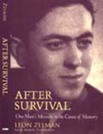Sort by: Author | Title | Publication Year
BOOKS
African Novels in the ClassroomMargaret Jean Hay, editor Some of the best college teachers have found novels to be extremely effective assignments in courses addressing various aspects of African studies. Here, two dozen of those teachers describe their favorite African novels—drawn from all over the continent—and share their experiences in using them in the classroom.
Each contributor discusses why a particular novel works well with More > | |
African Security and the African Command: Viewpoints on the US Role in AfricaTerry Buss, Joseph Adjaye, Donald Goldstein, and Louis Picard, editors In 2007, the Bush administration created a new military presence in Africa—AFRICOM (US Africa Command)—which has been vigorously debated ever since. Some see AFRICOM as the answer to an African security system crippled by a lack of resources, widespread politicization, and institutional weakness. Others claim that the program is nothing more than another attempt by the US to secure its More > |  |
African Voices: In Search of a Decolonial TurnSiphamandla Zondi What does it mean to decolonize knowledge ... in the university, the school, the library, the museum? In the context of this question, Siphamandla Zondi explores the contributions of African thinkers and actors to what Paul Tiyambe Zeleza calls recentering Africa in discussions about major African phenomena. His book is sure to stimulate further conversations about the many other African voices More > |  |
After D-Day: Operation Cobra and the Normandy BreakoutJames Jay Carafano In Operation Cobra, six US divisions during six dramatic days in Normandy ended the stalemate on the western front, breaking through German defenses after seven weeks of grueling attrition warfare. After D-Day examines the experiences of U.S. soldiers in the July 25-30, 1944, Normandy campaign: their mistakes, hardships, and fears, as well as their leadership, courage, and determination.
Drawing More > |  |
After Homicide: Victims’ Families in the Criminal Justice SystemSarah Goodrum In After Homicide, Sarah Goodrum examines the experiences of the families of murder victims as they encounter detectives, prosecutors, counselors, and others in the criminal justice system.
Goodrum traces each step of a murder investigation and trial, drawing on personal accounts and other primary sources. Based on extensive field research, her book is a uniquely comprehensive look at how the More > |  |
After Survival: One Man's Mission in the Cause of Memory [memoir]Leon Zelman, with Armin Thurnher and translated by Meredith Schneeweiss "How could you live in Vienna after the war?" foreign audiences frequently, accusingly ask Leon Zelman when he delivers lectures abroad, and in After Survival, Zelman painfully comes to grips with that question.
Leon Zelman is proud of his dual identities—Viennese and Jewish—the latter by birth, the first by a tragic twist of fate and then by choice. His early attempts to More > |  |
Afterimages: A Family MemoirCarol Ascher In her moving reflection on growing up as the daughter of refugees from Hitler's Europe, Carol Ascher explores the conflicts of an émigré childhood and chronicles her return to Vienna to uncover her father's roots.
More > |  |
Against Mediocrity: The Humanities in America's High SchoolsChester E. Finn Jr., Diane Ravitch, and Robert T. Fancher Against Mediocrity starts from, and argues vigorously for, the belief that the education of every American child must be founded on the humanistic disciplines. In sixteen essays, leading scholars, educators, and school policymakers eloquently assess the current condition of the humanities in the secondary schools, analyze how this state of affairs developed and what the humanities ought to be More > |  |
AI and Early Warning Systems: Technology Innovation for National SecurityRobert Mandel From the September 11 attacks to the coronavirus pandemic, recent deficiencies in early warning systems have been jolting, reflecting startling failures of intelligence and security decisionmaking. Can technological innovation remedy the flaws in threat detection? If so, how? Robert Mandel argues that the answer lies in a hybrid system—"human-in-the-loop" artificial More > |  |
Aiding Peace?: The Role of NGOs in Armed ConflictJonathan Goodhand As nongovernmental organizations play a growing role in the international response to armed conflict—tasked with mitigating the effects of war and helping to end the violence—there is an acute need for information on the impact they are actually having. Addressing this need, Aiding Peace? explores just how NGOs interact with conflict and peace dynamics, and with what results.
Jonathan More > |  |



